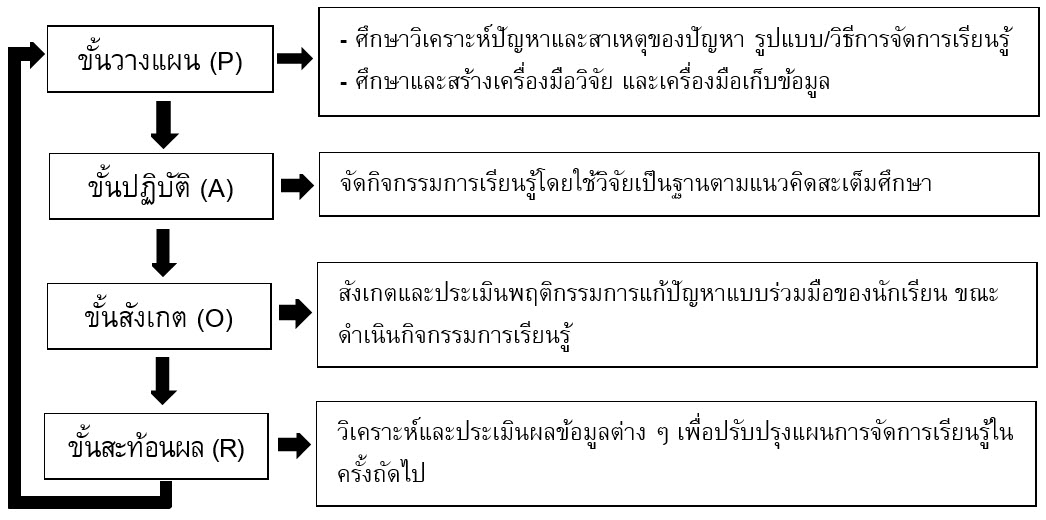การพัฒนาสมรรถนะการแก้ปัญหาแบบร่วมมือด้วยการจัดการเรียนรู้โดยใช้วิจัยเป็นฐานตามแนวคิดสะเต็มศึกษา เรื่อง เชื้อเพลิงซากดึกดำบรรพ์และผลิตภัณฑ์
Main Article Content
Abstract
Teerada Chaidech, Skonchai Chanunan and Wipharat Chuachuad Chaiyasit
รับบทความ: 30 กรกฎาคม 2559; ยอมรับตีพิมพ์: 18 เมษายน 2560
บทคัดย่อ
การวิจัยนี้เป็นวิจัยปฏิบัติการในชั้นเรียนโดยมีจุดประสงค์เพื่อศึกษาผลการพัฒนาสมรรถนะการแก้ปัญหาแบบร่วมมือของนักเรียนชั้นมัธยมศึกษาปีที่ 5 ด้วยการจัดการเรียนรู้โดยใช้วิจัยเป็นฐานตามแนวคิดสะเต็มศึกษา เรื่อง เชื้อเพลิงซากดึกดำบรรพ์และผลิตภัณฑ์ โดยกลุ่มเป้าหมายที่ศึกษาคือนักเรียนชั้นมัธยมศึกษาปีที่ 5 จำนวน 24 คน ของโรงเรียนวิทยาศาสตร์ภูมิภาคแห่งหนึ่งในเขตภาค เหนือตอนล่าง ผู้วิจัยดำเนินการจัดการเรียนรู้ในภาคเรียนที่ 2 ปีการศึกษา 2558 และเก็บรวบรวมข้อมูลโดยใช้แบบวัดสมรรถนะการแก้ปัญหาแบบร่วมมือ และแบบสังเกตการแก้ปัญหาแบบร่วมมือของนักเรียน ซึ่งประกอบด้วย 3 สมรรถนะหลัก ได้แก่ การสร้างและเก็บรักษาความเข้าใจที่มีร่วมกัน การเลือกวิธีดำเนินการที่เหมาะสมในการแก้ปัญหา และการสร้างและรักษาระเบียบของกลุ่มวิเคราะห์ข้อมูลเชิงคุณภาพโดยประเมินตามเกณฑ์ที่สร้างขึ้นโดยปรับมาจากกรอบการประเมินสมรรถนะการแก้ปัญหาแบบร่วมมือของ PISA 2015 โดยได้แบ่งเป็น 3 ระดับ ได้แก่ ระดับต่ำ ระดับกลาง และระดับสูง ผลการวิจัยพบว่า การจัดการเรียนรู้โดยใช้วิจัยเป็นฐานตามแนวคิดสะเต็มศึกษาสามารถพัฒนาสมรรถนะการแก้ปัญหาแบบร่วมมือของนักเรียนได้ โดยนักเรียนร้อยละ 95.8 มีสมรรถนะการแก้ปัญหาแบบร่วมมืออยู่ในระดับสูงหลังจากการจัดการเรียนรู้
คำสำคัญ: สมรรถนะการแก้ปัญหาแบบร่วมมือ การจัดการเรียนรู้โดยใช้วิจัยเป็นฐาน สะเต็มศึกษา เชื้อเพลิงซากดึกดำบรรพ์และผลิตภัณฑ์
Abstract
This classroom action research aimed to investigate grade eleven student’s collaborative problem solving (CPS) by using research-based learning according to STEM education in learning topic of fossil fuels and products. The participants were 24 eleventh grade students from a regional science school in the second semester of 2015 academic year. Data were gathered by CPS test and CPS observation form, consisted of 3 major CPS competencies which were establishing and maintaining shared understanding, taking appropriate action to solve the problem and establishing and maintaining team organization. The students’ collaborative problem solving competency was analyzed by using CPS rubric score that was adapted from PISA 2015 framework. According to PISA frameworks’ CPS, the level of proficiency in CPS was identified in three levels, low, medium and high. The finding indicated that learning management using research-based learning according to STEM education can improve students’ collaborative problem solving competency. After learning activity, 95.8% of students had collaborative problem solving competency at high level.
Keywords: Collaborative problem solving competency, Research-based learning, STEM education, Fossil fuels and products
Downloads
Article Details

This work is licensed under a Creative Commons Attribution-NonCommercial 4.0 International License.
References
Achakunwisut, E. (2014). Assessing collaborative problem solving of PISA 2015. IPST Magazine 31(191): 37–41. (in Thai)
Bureau of Academic Affairs and Educational Standards. (2015). Collaborative Problem Solving. Retrieved from https://drive.google.com/folderview?id=0BwnYgcDtSNqaQkU3VzVEdXdqNG8&usp=sharing&tid=0BwnYgcDtSNqaTTIwS1ZhdHVXMzg, August 25, 2015. (in Thai)
Chulavatnatol, M. (2013). STEM education Thailand and STEM ambassadors. IPST Magazine 42(185), 14-18. (in Thai)
Inta, K., Chaiworn, P., and Ratchawet, A. (2015). The learning activity packages creation with the title “Amazing Rubber” by using STEM education curriculum and 21st century skills development for secondary education level. Journal of Faculty of Education Pibulsongkram Rajabhat University. 1(special): 132–141. (in Thai)
IPST. (2013). Teacher’s Guide; Chemistry Volume 5 for Grade 10 – 12 students. Bangkok: Author. (in Thai)
McNaught, C. (2014). Implementing Research-based Education at UCL. Retrieved from http://www.ucl.ac.uk/teaching-learning/con nected-curriculum/research-based-education, May 2, 2015.
Khammani, T. (2014). Teaching Strategies; Knowledge for Effective Learning Management. Bangkok: Chulalongkorn University. (in Thai)
Khammani, T. (2003). 14 Strategies for Professional Teacher. Bangkok: Chulalongkorn University Printing House. (in Thai)
Klainin, S., Dechsri, P., and Pramojanee, A. (2006). Problem Solving Competency for Tomorrow World. Bangkok: Seven Printing Group. (in Thai)
Ministry of Education. (2012). Basic Education Core Curriculum B.E. 2551. Bangkok: The Agriculture Co-operative Ferederation of Thailand Printing. (in Thai)
Ministry of Education. (2012). Learning Management in World-Class Standard School. Bangkok: The Agricultural Co-operative Federation of Thailand. (in Thai)
Office of the Basic Education Commission [OBEC]. (2012). Improving Life Skills Focus on the Quality of Learning for Primary-Secondary Student. Bangkok: The Agricultural Co-operative Federation of Thailand. (in Thai)
Organisation for Economic Co-operation and Development. (2013). PISA 2015 Draft Collaborative Problem Solving Frame work. Retrieved from http://www.oecd.org/pisa/pisaproducts/Draft%20PISA%20 2015%20Collaborative%20Problem%20Solving%20Framework%20.pdf, February 15, 2015.
Panich, V. (2012). Learning Strategies for Student in 21st Century. Bangkok: Sodsri-Saritwong Foundation. (in Thai)
Patipatanon, S. (2006). A Comparative Study of Social Studies Achievement, Democratic Personality and Group Process Skills of Mathayom Suksa One Students Among Groups Using Storyline, Research-Based, and Conventional Instruction. Bangkok: Faculty of Education, Chulalongkorn University. (in Thai)
Princess Chulabhorn’s College. (2012). High School Curriculum of Princess Chulabhorn’s Collage B.E. 2554. Retrieved from http://www.pccpl.ac.th/pccpl2012/images/imagefile56/curi_sec.pdf, August 20, 2015. (in Thai)
Ramsiri, R., and Nillapun, M. (2015). The development of science instructional model by using research-based to enhance research skills, creative problem-solving skills and scientific minds of secondary school students. Silpakorn Educational Research Journal 7(1): 110–122. (in Thai)
Saengpromsri, P., Nuangchalerm, P., and Chantiratikul, P. (2015). Comparisons of learning achievement, integrated science process skills, and attitude towards chemistry learning for Matthayomsueksa 5 students between STEM education and conventional methods. Journal of Education, Mahasarakham University 9 (Special): 401–418. (in Thai)
Siripatharachai, P. (2013). STEM Education for developing 21st century skills. Executive Journal 33(2): 49–56. (in Thai)
Tammachart, J. (2012). A research and development of research-based learning management model in the educational research course. Songklanakarin Journal of Social Science and Humanities 18(1): 183–214. (in Thai)
Wongwanich, S. (2014). Classroom Action Research. Bangkok: Chulalongkorn University Printing House. (in Thai)
Worakham, P. (2009). Educational Research. Kalasin: Prasarn Printing. (in Thai)
